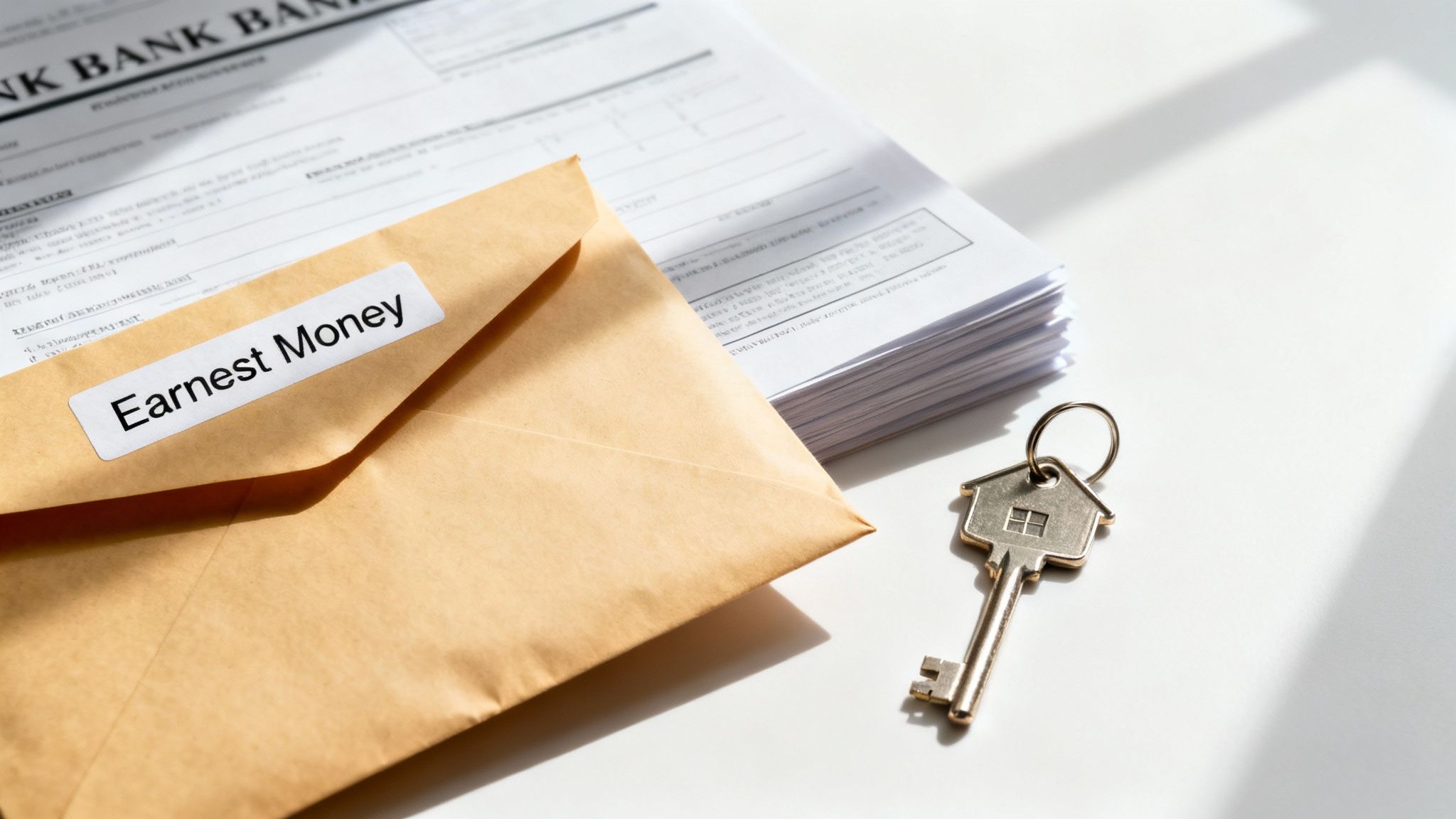When selling your home to a cash buyer, asking the right questions is crucial to ensure a smooth, legitimate, and profitable transaction. The three main questions should assess the buyer’s financial readiness for closing and their understanding of the offer details and their planned timeline for completion. A serious cash buyer needs to show proof of funds and explain their inspection process and all costs and provide verifiable references. Asking these questions upfront protects you from potential scams, last-minute renegotiations, and deals that fall through, allowing you to move forward with confidence.
Homeowners who want fast cash sales along with guaranteed transactions and easy processes should consider selling their homes for cash. The process avoids the time-consuming and unpredictable steps which occur during standard home sales that depend on mortgage approval. The market for cash buyers includes various types of buyers who range from individual fix-and-flip investors to nationwide corporate entities. The successful navigation of this market demands that you become a knowledgeable seller.
This guide provides the top 10 questions every homeowner should ask a potential cash buyer. These questions are designed to help you vet their legitimacy, understand the true nature of their offer, and protect your financial interests. The checklist helps you evaluate cash offers effectively while identifying potential problems and selecting qualified buyers who meet your professional standards and closing conditions. The following questions will help you identify the best solution for your particular situation whether you want to avoid foreclosure or need to sell an inherited property or want to sell quickly without any complications.
1. Can You Provide Verifiable Proof of Funds?
The most important question to ask. The process helps separate genuine buyers who have the necessary funds from those who are trying to resell or wholesaling without having enough money to finalize the purchase. The funding contingency becomes null and void through a valid cash offer but the absence of proof of funds makes the financing advantage useless.
You need to see tangible evidence that the buyer has unrestricted access to the liquid funds required for the purchase price. A verbal assurance is not enough. The requirement for proof of funds protects your deal from falling apart weeks after you start negotiations which would force you to begin the process again.
What Constitutes Valid Proof of Funds?
A professional buyer should produce verifiable documentation without hesitation. Acceptable forms include:
- Bank Statements: Recent statements (dated within the last 30 days) showing a sufficient balance in a checking or savings account.
- Brokerage Account Statements: Statements from an investment account showing a liquid cash position or easily liquidated assets.
- A Signed Letter from a Financial Institution: A signed formal letter on bank letterhead by a bank officer that verifies the buyer’s name and available funds.
- Certified Financial Statement: A CPA-prepared document that shows all liquid assets of a buyer.
For individual investors, bank statements are common. Larger companies, such as national home buyers, may provide a formal letter from their financial institution.
Key Insight: A “proof of funds” letter from a hard money lender is not a true cash offer. The buyer’s loan usage indicates that financing risk remains active which you wanted to eliminate.
Actionable Tips for Verifying Funds:
- Check the Date: Ensure all documents are current, preferably within the last 30 days.
- Verify the Name: The name on the POF document must match the name of the buyer on the purchase agreement.
- Accept Redactions: It’s reasonable for a buyer to redact sensitive account numbers, but the institution’s name, account holder’s name, and available balance must be visible.
- Use a Third Party: Your title company or real estate attorney can help authenticate the documents, adding a professional layer of security.
The fundamental question allows you to concentrate on buyers who have demonstrated financial capacity to make a purchase. The information about cash home buyers in your area will help you understand what to expect during these discussions.
2. What Is Your Timeline for Closing the Transaction?
The main reason people choose a cash offer is because it closes the sale quickly. The buyer’s response to this question helps determine if their move-in schedule matches your requirements for either a seven-day move-in or a 30-day flexible period. The method through which the customer operates and their level of expertise becomes evident through this process.
A clear, confident answer indicates a seasoned professional, while a vague or non-committal response could signal inexperience or that the buyer is still lining up their funds. The entire process will follow the expectations set during this discussion.

What Is a Realistic Closing Timeline?
Different types of cash buyers operate on different schedules. Understanding these norms helps you evaluate the offer.
- National Home Buyers: Companies like Eagle Quick for Cash are often equipped to close in as little as 7-14 days but can also offer flexible timelines to match your schedule.
- Fix-and-Flip Investors: These buyers usually aim for a 10-21 day closing to start renovations quickly.
- Buy-and-Hold Investors: Their timeline might be slightly longer, around 21-30 days, as they arrange for property management and tenant placement.
- Individual Cash Buyers: A person buying with cash but who still wants inspections might require a standard 21-30 day timeline.
Understanding how timelines impact your decision is crucial; you can explore the nuances of when it is best to sell your house for cash.
Key Insight: Be wary of a buyer who cannot provide a specific closing date. The phrase “as soon as possible” lacks the characteristics of a real commitment. A professional buyer will propose a firm date and outline the steps to meet it.
Actionable Tips for Managing the Timeline:
- Get It in Writing: The agreed-upon closing date must be explicitly stated in the purchase agreement.
- Ask About Flexibility: Inquire if the buyer can accommodate a slightly different closing date if your plans change.
- Confirm Key Milestones: Ask about the schedule for the earnest money deposit, inspections, and final walk-through.
By asking direct questions about the closing timeline, you can verify that the buyer’s speed aligns with your goals.
3. Do You Conduct an Inspection, and Is the Offer Contingent on It?
Many sellers assume a cash offer means no inspection. Most professional investors choose to conduct property inspections although some buyers decide to skip this step. The question helps you understand their approach to negotiations which lets you predict their potential price reduction strategies.
An inspection contingency is an escape clause for the buyer. Even in an “as-is” sale, a buyer who finds unexpected major issues during their “due diligence period” may try to lower the offer price or back out. Understanding their inspection process upfront is key.

How Cash Buyer Inspections Differ:
- House Flippers: Conduct detailed inspections, often with contractors, to precisely calculate their repair budget.
- Wholesalers: May do a quick walk-through to assess the property’s condition for marketing the contract to their network of end buyers.
- National Home Buyers: Often use a combination of virtual assessments and a brief, in-person verification. They look for major structural issues but typically buy the home “as-is” without asking for repairs.
- Buy-and-Hold Investors: Focus on the home’s core systems—roof, plumbing, electrical, and HVAC—to understand long-term maintenance costs.
Key Insight: An “as-is” offer does not always mean the buyer waives their right to inspect. A home sale “as-is” means the seller does not have to fix anything but the buyer can use the inspection report to negotiate a better deal or cancel the sale during their inspection period. A truly firm “as-is” offer has no inspection contingency.
Actionable Tips for Navigating the Inspection:
- Get It in Writing: Ensure the purchase agreement clearly states whether there is an inspection contingency and defines its terms.
- Clarify “As-Is”: Ask the buyer to confirm that their “as-is” offer will not be reduced based on inspection findings.
- Set a Firm Timeline: The contract should specify a short, defined “due diligence” period (typically 5-10 days for cash buyers).
Asking about inspections helps you gauge the true strength of an offer and prevents last-minute surprises.
4. Are There Any Other Contingencies in Your Offer?
A primary advantage of a cash sale is the elimination of financing and appraisal contingencies, which dramatically increases deal certainty. The buyer needs to reveal any additional requirements which must be satisfied before the sale can move forward.
Some “cash” buyers insert other contingencies that act as escape hatches. Understanding these clauses is essential because they represent risks that could derail your sale.
Common Cash Offer Contingencies:
- Inspection Contingency: As discussed, this is the most common. It allows the buyer to back out based on the home’s condition.
- Title Clearance: A standard and necessary contingency. It ensures the property has a clean title, free of liens or ownership disputes.
- Partner Approval: A red flag. This contingency means the buyer needs someone else’s permission to proceed, making the offer uncertain.
- HOA Document Review: If your property is in a homeowners’ association, the buyer will want to review its rules and financials.
Key Insight: A cash offer with an appraisal contingency is a major red flag. The buyer is essentially saying they will only pay the offered price if an appraiser agrees with the value, which defeats one of the core benefits of selling for cash.
Actionable Tips for Managing Contingencies:
- Set Strict Deadlines: Insist on a short, defined period for any contingency (e.g., 5-7 days).
- Demand Specificity: Vague clauses like “subject to satisfactory inspection” are risky. Require specific, measurable conditions.
- Question Every Clause: Ask the buyer to justify each contingency. This can reveal whether they are protecting a legitimate interest or building in loopholes.
Scrutinizing contingencies protects the integrity of the transaction. For more answers to common concerns, this comprehensive cash buyer FAQ can be a valuable resource.
5. How Much Is Your Earnest Money Deposit?
An earnest money deposit (EMD) is a “good faith” payment showing a buyer is serious. The amount, timing, and holding arrangement of the EMD speak volumes about the buyer’s commitment. It provides you with financial recourse if the buyer defaults on the contract.
A substantial EMD from a cash buyer signals confidence and reduces your risk. Conversely, a buyer hesitant to put down a meaningful deposit may lack commitment or financial resources.

What Is a Standard Earnest Money Deposit?
- Traditional Sales: Typically 1-3% of the purchase price.
- Cash Investors: Often deposit 5-10% or a fixed amount (e.g., $5,000-$10,000) to make their offer more competitive.
- National Buyers: Amounts vary, but they are typically significant enough to demonstrate serious intent.
A higher percentage indicates lower risk for you.
Key Insight: The deposit should always be held by a neutral third party, such as a title company, escrow agent, or real estate attorney. Never allow the funds to be held directly by the buyer or their company.
Actionable Tips for Handling Earnest Money:
- Specify the Timeline: Require the deposit to be made within 24 to 48 hours of an accepted contract.
- Verify the Holder: Confirm in writing that the EMD will be held in escrow by your chosen title company or attorney.
- Define Forfeiture Conditions: The purchase agreement should clearly state the conditions under which you are entitled to keep the deposit.
- Get Written Confirmation: Always get a receipt from the escrow agent once the funds have been deposited.
This question helps you gauge a buyer’s seriousness and secures your position in the transaction.
6. Who Pays for Closing Costs?
A cash offer’s attractive price can be misleading if you get hit with thousands of dollars in unexpected closing costs. A transparent buyer will clearly outline who pays for what. Common closing costs include title insurance, escrow fees, transfer taxes, and recording fees.
Some cash buyers, particularly national companies, often cover all closing costs, meaning the offer price is your net amount. Others may expect you to pay traditional seller’s costs. This question ensures there are no financial surprises on closing day.
Typical Closing Cost Scenarios:
- Seller Pays All: Less common, but sometimes negotiated.
- Buyer Pays All: A significant benefit offered by many national cash buyers to make their offer more appealing.
- Split Costs: The most common scenario in traditional sales, where sellers and buyers each pay for specific items according to local customs.
Key Insight: Demand a written breakdown of the costs. A professional buyer will provide a preliminary settlement statement or a clear clause in the purchase agreement detailing the allocation of every fee.
Actionable Tips for Clarifying Costs:
- Request a Net Sheet: Ask the buyer for an estimated net sheet showing the offer price minus all your expected costs to calculate your final proceeds.
- Scrutinize the Contract: Ensure the purchase agreement explicitly states which party is responsible for each closing cost.
- Ask About Hidden Fees: Confirm there are no “administrative,” “service,” or “platform” fees that will be deducted from your proceeds.
Understanding closing costs is crucial when comparing a cash offer to a traditional sale where you would pay agent commissions. Explore a breakdown of typical real estate commission rates and fees to understand these potential savings.
7. Can You Provide References from Recent Sellers?
This question gauges the buyer’s reputation and track record. A legitimate, experienced cash buyer should be proud of their history and willing to provide references from satisfied clients. Their hesitation or inability to do so is a major red flag.
References give you a firsthand account of what it’s like to work with the buyer. You can learn about their communication, professionalism, and whether they honored their original offer and timeline.
Who to Ask for as a Reference:
- Recent Sellers: Ask for contact information for one or two homeowners who sold to them in the last six months.
- Title Company: Inquire about the title company they typically use. A title agent can confirm if they are a regular client who closes deals smoothly.
- Online Reviews: Check for reviews on Google, the Better Business Bureau (BBB), and other third-party sites.
Key Insight: A buyer’s reputation is one of their most valuable assets. An established investor or company will have a portfolio of successful transactions and positive testimonials ready to share.
Actionable Tips for Checking References:
- Ask Specific Questions: When speaking with a reference, ask: “Did they close on time?” “Did they try to change the offer price last minute?” “Was the process as easy as they promised?”
- Check Business Credentials: For a company, look them up on your state’s Secretary of State website to ensure they are a registered business in good standing.
- Trust Your Gut: If the references seem coached or overly generic, it could be a warning sign.
8. Are You the Direct Buyer or Are You Wholesaling the Property?
This is a critical distinction. A direct buyer is purchasing your home for their own purposes, such as to renovate and resell (flip) or to hold as a rental property. A wholesaler, on the other hand, intends to put your home under contract and then assign (sell) that contract to another buyer for a fee.
Selling to a direct buyer is generally safer and more certain. With a wholesaler, the deal is contingent on them finding an end buyer, which adds a layer of uncertainty. If they can’t find one, the deal will likely fall through.
How to Identify a Wholesaler:
- Vague About Funds: They may be hesitant to provide POF because the funds will be coming from the end buyer.
- “And/or Assigns” Clause: Look for this language in the contract, which gives them the right to assign it to someone else.
- Long Inspection Period: They may request a longer inspection or due diligence period to give them time to find a buyer.
Key Insight: While wholesaling is a legal real estate strategy, it carries more risk for the seller. A direct buyer has their own capital and a clear plan for the property, making the transaction far more secure.
Actionable Tips:
- Ask Directly: Simply ask, “Are you the end buyer for this property?”
- Review the Contract: Scrutinize the purchase agreement for any assignment clauses.
- Prioritize Direct Buyers: For the highest level of certainty, it is often best to work with a direct buyer.
Knowing who you are dealing with is fundamental to a secure transaction. To get more clarity on what to expect, learning how to sell your house fast for cash can prepare you for a smooth process.
9. What Happens if I Need to Change the Closing Date?
Life is unpredictable. You might face a moving delay, a family emergency, or a snag in securing your next home. A professional and customer-focused cash buyer will understand this and offer some degree of flexibility.
This question tests the buyer’s rigidity and business model. A high-volume flipper working on a tight schedule may be less accommodating than a national home buyer with more robust operational systems. Knowing their policy on timeline adjustments can save you significant stress.
Key Insight: The best cash buyers build flexibility into their process. They understand that a smooth and positive seller experience is key to their reputation and long-term success.
Actionable Tips:
- Discuss Potential Scenarios: Ask “what if” questions upfront. For example, “What if I need an extra week after the closing date to move out?”
- Look for Lease-Back Options: Some buyers offer a short-term lease-back agreement, allowing you to stay in the home for a brief period after closing.
- Get Flexibility in Writing: If you anticipate needing flexibility, make sure the terms are included as an addendum to the purchase agreement.
10. What Is Your Process After We Sign the Contract?
A professional cash buyer will have a clear, step-by-step process they can easily explain to you. This question helps you understand what to expect between signing the agreement and receiving your money. It demonstrates their organization and experience.
A clear process reduces seller anxiety and ensures everyone is on the same page. The buyer should be able to outline key milestones, communication protocols, and the roles of the title company and other parties.
A Typical Cash Sale Process Includes:
- Contract Signed: Both parties sign the purchase agreement.
- Earnest Money Deposited: The buyer deposits the EMD with the title company.
- Title Search: The title company conducts a search to ensure the property has a clear title.
- Inspection/Due Diligence: The buyer completes their property assessment within the agreed-upon timeframe.
- Closing Documents Prepared: The title company prepares the final paperwork.
- Final Walk-Through: The buyer may do a quick walk-through before closing.
- Closing: You sign the documents, the buyer wires the funds, and you receive your money.
Key Insight: A buyer who cannot clearly articulate their process may be inexperienced, which could lead to delays and complications. Look for a buyer who provides a dedicated point of contact to guide you through each step.
Making an Informed Decision: Your Path Forward
Selling your home is one of the most significant financial decisions you’ll make. By arming yourself with these ten essential questions, you transform yourself from a passive seller into an empowered one. You are no longer just accepting an offer; you are actively vetting a business partner for a major transaction. This diligence allows you to confidently distinguish a professional, reliable buyer from an inexperienced operator or a potential scam.
Your goal is to find a solution that meets your specific needs—whether that’s the speed to avoid foreclosure, the simplicity to settle an estate, or the convenience of an “as-is” sale. There are several paths you can take to find the right cash buyer. You can research local investors, ask for referrals, or work with a real estate agent who specializes in off-market properties. Each of these options requires you to apply this checklist to vet each potential buyer individually.
Alternatively, you can simplify the process by working with a reputable, national cash home buyer. These established companies have built their business models on transparency, efficiency, and reliability. They anticipate these critical questions and have streamlined systems to provide clear answers and a dependable closing experience. This can be a more direct route to a secure and hassle-free sale.
Whichever path you choose, your confidence will come from the quality of the information you gather. By asking these tough but necessary questions, you are not just selling a house; you are ensuring a positive outcome and securing your peace of mind.
Ready to work with a trusted national buyer who can answer all these questions upfront? Eagle Cash Buyers provides fair, no-obligation cash offers with a transparent and proven process. See how a professional cash home buying experience works and get your reliable offer today at Eagle Cash Buyers.





